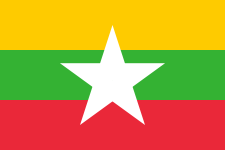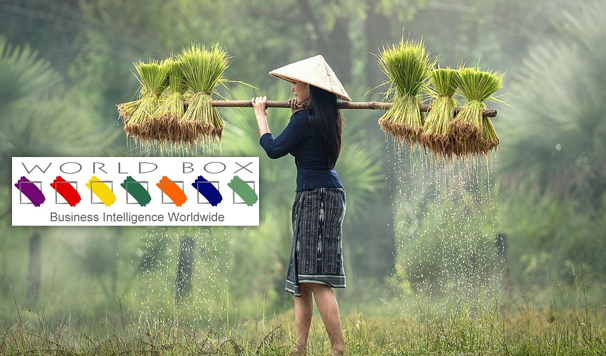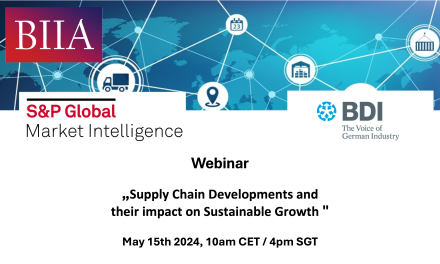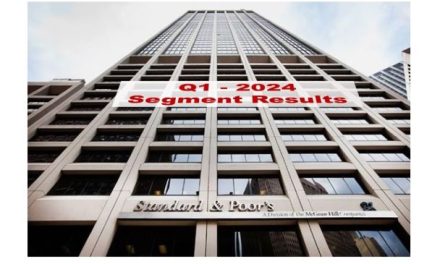Worldbox Business Intelligence Risk Rating – February 2024
MYANMAR
Summary
| Overall Risk Score 12 (Stable)
Political risk: Stable 4/10 Economic risk: Stable 4/10 Commercial risk: Stable 4/10 The risk assessment of a country is made up of 3 components, being Political, Economic and Commercial. Each component is scored out of 10 with 1 being the highest risk and 10 the lowest. |
ESG Risk: 4/10 (Stable)*
*Environmental, social and governance (ESG) issues are becoming increasingly important to companies, investors and consumers in Southeast Asia. That is why we are now preparing a separate ESG score and section with our quarterly country risk reports. We explain how each country rates, looking at the E, S and G individually, and outline recent developments. |
Political Risk – Stable at 4
The rebellion against the military, which has been in power since 1962, intensified significantly in 2023. The country’s civil war is the longest running armed conflict in the world as ethic groups battle for autonomy. No Burmese government has been fully in control of the country since independence in 1948.
The ethnically diverse country fragmented into numerous civil conflicts. Officially, there are more than 135 ethnic groups in the country of more than 55 million people. However, the majority Bamar (also known as Burman) ethnic group has dominated both the military and major parties, such as the NLD.
The rebel insurgency, along with a campaign of civil disobedience, has escalated significantly since the 1 February 2021 military coup that ousted Aung San Suu Kyi’s elected government. Following the coup, lawmakers formed a government in exile, the National Unity Government (NUG), which established the Peoples’ Defence Force (PDF) of civilians, which has fought alongside established ethnic armed groups.
China could prove key to any peace talks. ASEAN has been marginalized, while China’s veto has protected the government from any action by the United Nations. Although the NUG holds the country’s seat at the United Nations, it has struggled to win international recognition — the EU recognizes the NUG but Japan and the United States do not.
China now increasingly appears to be hedging its bets with at least tacit support for the rebels. Beijing has been alarmed by the scale of the lawlessness, including drug trafficking and cyber scam centres, in areas of northern Myanmar bordering China. It is also alert to the dangers of having a failed state on its borders. Supporters of the Myanmar military have held several demonstrations in major cities accusing China of aiding the rebel alliance. If China exerts pressure on the military to come to a deal with the rebels the generals may have little option but to agree given the military outlook for the government appears increasingly bleak.
Economic Risk – Stable at 4
Given the civil war raging in the country it’s very difficult to gain an accurate picture of what is happening to the economy. The junta hasn’t published monthly economic data since mid-2022 and figures from the World Bank and other organizations are at best guesstimates of what is happening in the country and could well be wildly inaccurate.
It is known that war is severely disrupting economic activity, which was already badly hit by the impact of the pandemic. The military takeover in February 2021 has caused foreign investment and tourist numbers to plummet, while exports have also been hit. Moreover, rolling blackouts are disrupting economic activity.
According to a commentary by Zachary Abuza, a professor at the National War College in Washington, broadcast on Radio Free Asia in September:
“It’s hard to overstate just how bad Myanmar’s economy is. Although the World Bank predicts GDP to grow at 2 to 3% this year, the economy has contracted by 12% since January 2021. A decade’s worth of economic growth was eviscerated.”
In the first eight months of 2023, exports fell by 9.8% to US$5.93 billion, with a US$500 million trade deficit. Meanwhile, the black market rate for the US dollar is 3,900 kyat, a 300% decline in the value of the currency since the February 2021 coup.
Commercial Risk – Stable at 4
Myanmar is rated as one of the most difficult countries in the Asia–Pacific region in which to do business even prior to the military coup. It ranked 165 among 190, according to the 2021 World Bank Ease of Doing Business guide. This ranking has almost certainly fallen sharply since that report.
Since the coup, the banking system has been disrupted significantly. Sending money out of Myanmar is extremely difficult, with much stricter oversight by the central bank, harming international trade and commerce. Access to and use of the internet is more difficult, with internet shutdowns common, and the disruptive effect on business activity has been magnified by the coronavirus and the associated need for remote working. Privacy and data-security concerns have also increased. Entering, leaving and moving around the country are difficult, with safety concerns about staff a major issue given the deteriorating security situation in many areas of the country.
Meanwhile, government decision-making and the administrative process are much slower and less predictable, affecting even routine matters such as tax administration and visa processing. Senior government personnel in many positions have changed, while new policies have been adopted, and the civil disobedience campaign has severely disrupted administrative processes.
The rule of law has suffered further setbacks. Even prior to the pandemic, businesses reported very low trust in the independence of the judiciary, with bribes and irregular payments in exchange for favorable judicial decisions very common.
Corruption – already a significant challenge – has worsened as living standards have plummeted. Myanmar ranks 157th out of 180 countries in Transparency International’s 2022 Corruption Perceptions Index. The Myanmar Corruption Report by GAN says that corruption is endemic in Myanmar, presenting companies with high risks. The weak rule of law and complex and opaque licensing systems are serious barriers to investment and trade in Myanmar.
A lack of adequate infrastructure also provides significant challenges to operating in Myanmar. Sanctions levied since the 1960s have caused Myanmar’s infrastructure to become outdated. Much of the country’s electrical grid relies on hydropower, and factory operation, for example, becomes unreliable during dry seasons. While there has been significant growth in the country’s paved road network, the vast majority of the network – around 60% – remains unpaved. Meanwhile, port capacity is limited and the railway service depends on aging and unreliable equipment.
February Bulletin
Political Risk – Stable at 4
In recent months, insurgent forces, mostly ethnic militias that operate on the country’s borders, have launched coordinated offensives that have enabled the seizure of four border trading points with China. As many as 160 military posts may have been seized by the Three Brotherhood Alliance formed by the Arakan Army, Myanmar National Democratic Alliance Army, and the Ta’ang National Liberation Army. NUG officials say that more attacks will follow and the offensive will be widespread, including strikes and demonstrations in cities. The International Crisis Group’s Myanmar expert, Richard Horsey, has said that “this is the biggest battlefield challenge that the Myanmar military has faced for decades.”
The NUG now claims to control 60% of the country’s territory and says that the military regime is on the point of collapse. Certainly, morale in the military appears very low. Military units are reported to have surrendered without fighting while others have abandoned their posts and fled to neighbouring India. Recruitment of fresh troops to replenish losses is also a significant problem.
The likelihood is that the miliary will be forced to retreat from peripheral areas of Burma dominated by ethnic groups to central Myanmar. However, as the Interpreter explains:
“As the Tatmadaw losses mount, it may retreat to major population centres and military bases. The rebel forces, controlling much of the countryside, will likely be able to isolate Tatmadaw units defending these areas. The junta may use its airpower to push back the rebels, but airpower alone is insufficient to win an insurgency. The junta could be staring at defeat should the rebel push continue. Being compelled to negotiate for a peaceful power transfer is far preferable to a drawn-out fight only to be overthrown.”
Economic Risk – Stable at 4
Economic conditions stabilized in the first half of 2023, according to the World Bank’s Myanmar Economic Monitor published in June 2023. The Monitor added that the exchange rate remained steady, while inflation in food and fuel prices eased. Most indicators, according to the Monitor, suggest economic activity is slowly increasing, albeit from a very low base. Manufacturing output and new orders have risen quickly, sales of domestic products have picked up, while passenger and freight transport volumes are rising, the publication added.
In its June Monitor, the World Bank forecast GDP would increase by 3% in the year to September 2023, still around 10% lower than in 2019. The absence of a more pronounced rebound is indicative of the severe supply and demand constraints that continue to limit economic activity, it added. Over the next one to two years, the World Bank’s baseline projection is for the economy to continue to expand slowly.
In September 2023, the Asian Development Bank (ADB) predicted inflation would hit 14.0% in 2023, 3.5 percentage points higher than its previous forecast in April. This contrasts with ADB’s downward revision from 4.2% to 3.6% for the entire developing Asia region. Currency depreciation is fueling the rise in prices. Food and medicine costs have soared, and basics like cooking oil and rice are two to three times higher than at the start of 2021.
The World Bank expects the current account deficit to widen to almost 6% of GDP in the year ending September 2023, up from 3.6% in the previous year. Exports are projected to remain subdued through to September 2024 as global demand remains tepid, but an increase in remittances is expected to provide some support, added the Bank.
Meanwhile, the Bank estimates that the fiscal deficit widened to 5.4% of GDP in the year ended April 2023, reflecting modest increases in spending and reductions in revenue. Lower non-tax receipts have been broadly offset by increased energy and tax revenues while expenditure growth has been driven by defense spending and State Economic Enterprises, particularly in the energy sector.
Commercial Risk – Stable at 4
Commercial risk has increased significantly since the coup, amid a deterioration in the ability of government ministries and the banking and legal systems to function effectively. Consequently, many foreign companies are leaving. European multinationals have withdrawn from Myanmar’s telecom and energy sectors, for example, which have close ties to the military. They also are shrinking their presence in the garment industry, a major economic driver, with H&M and Zara among the latest companies to leave.
Thai and Chinese companies are filling the gap. China’s Union Resources & Engineering and Yunnan Energy Investment are building a US$2.5 billion power plant in the Ayeyarwady region in southern Myanmar, for example. Meanwhile, Thai Beverage-owned Fraser and Neave, a Singapore-based brewer, said in July it would spend U$14.1 million to acquire alcohol licenses and land-use rights in Myanmar. F&N will build a brewery through a joint venture with a local company. In 2022, Thailand’s Northern Gulf Petroleum acquired rights to the Yetagun undersea gas project after Japan’s Eneos Holdings and Malaysia’s Petronas withdrew from the project. Most of around 400 Japanese businesses that operate in the country are also continuing their operations.
Environmental, Social and Governance (ESG) – Stable at 4
The United Nations’ Sustainable Development Goals (SDGs) are recognized as a beneficial framework for responsible investment. The Sustainable Development Report from Cambridge University Press assesses the progress of all 193 UN Member States on the SDGs. It provides a useful means of ranking Southeast Asian countries on their ESG progress.
Myanmar is ranked 103 out of 163 in the 2022 report with a score of 64.3.
Environment – According to the East Asia Forum, Myanmar is “a climate change hotspot with a tropical climate, long coastlines, varied topology and a large population in climate-sensitive areas”. It adds that cyclones frequently affect the delta region, encompassing main population centres in Yangon and Ayeyarwady, while droughts, intense rainfall and flooding threaten states in the central dry zone, particularly Mandalay. Agriculture, primarily smallholder farming, is Myanmar’s largest sector and is highly sensitive to shifts in climatic regimes, says East Asia Forum.
Social – According to the IndustriALL Global Union, which represents 50 million workers in 140 countries in the mining, energy and manufacturing sectors, the situation for workers continues to deteriorate. It says:
“Unions have been outlawed and with no mechanism to help workers and no freedom of association, workers are in a very vulnerable situation. Violations against workers are increasing, as is wage exploitation, forced labour and harassment against women. The military has cracked down on unions and its members, with violent attacks and arrests.”
Governance – Another area where Myanmar scores very poorly, reflecting high levels of corruption and the lack of the rule of law. The IFC – a sister organization of the World Bank – reported in 2018 that the current level of governance standards in most firms in Myanmar was very low. It added that governance structures at Myanmar firms remain largely underdeveloped with poorly functioning boards, antiquated management control processes, and low levels of transparency. Governance levels are likely to have deteriorated even further since.
February Bulletin
Environmental, Social and Governance (ESG) – Stable at 4
Nikkei Asia reported in September 2023 the intensifying civil war poses a severe threat to the country’s forests by undermining conservation programmes and facilitating illegal logging on a massive scale. Forests accounted for 44% of the country’s land in 2020 according to the World Bank. Nikkei Asia quoted Nikita Bulanin, an adviser at the International Work Group for Indigenous Affairs, a Denmark-based NGO as saying both mining and logging activities have intensified since the military coup in 2021, and conservation efforts involving indigenous communities have declined.
Without a settlement of the civil war, environmental forest problems are likely to intensify as indigenous groups are forced to engage in mining and logging to survive. More than 17 million people were officially estimated to rely on the forests and their resources for their livelihoods in 2017.
Latest economic data

f forecasts
Source: World Bank/Asian Development Bank, except where stated.
Useful links
https://www.worldbank.org/en/country/myanmar/publication/myanmar-economic-monitor-reports
https://www.transparency.org/en/cpi/2021
https://www.imf.org/en/Countries/MMR
https://www.adb.org/countries/myanmar/main
About Worldbox Business Intelligence
Worldbox Business Intelligence, headquartered in Switzerland, is a Global API data solution provider of business intelligence and used in data analytics.
With the Global API solution Worldbox Business Intelligence enables clients and partners also a frictionless real time onboarding, KYC and compliance verification while rapid global investigations are provided, if needed.
Worldbox Business Intelligence provides global data in a standardised structure to more than 200 Million companies worldwide. The global network of subsidiaries, branches and desks allows to precisely and efficiently collect data and target key territories for clients and partners.”
“Worldbox Business Intelligence – Bringing Swiss Precision To Data”
Copyright (C) 2024 Worldbox Business Intelligence. All rights reserved.
Our mailing address is:
Worldbox Business Intelligence
Breitackerstrasse 1
Zollikon
Zurich 8702
Switzerland





























